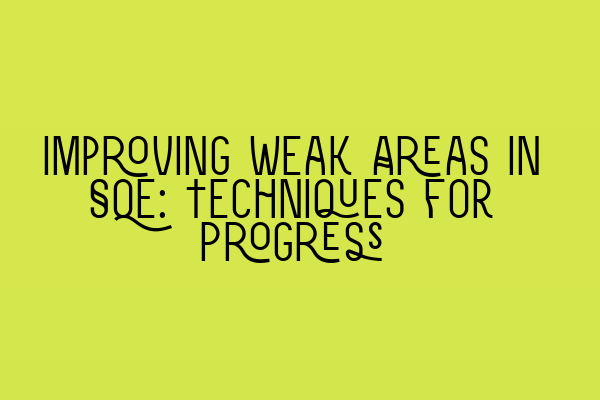Improving Weak Areas in SQE: Techniques for Progress
Preparing for the Solicitors Qualifying Examination (SQE) can be a challenging and rigorous process. As you study for the exam, you may identify certain weak areas that require additional attention and improvement. In this blog post, we will explore effective techniques for enhancing your knowledge and skills in these weak areas, helping you to confidently tackle the SQE and achieve success.
1. Identify Your Weak Areas
The first step in improving weak areas is to identify them. Take the time to review your performance in SQE mock exams and analyze the feedback provided. Look for patterns and common mistakes that you consistently make. This will help you pinpoint the specific subjects or skills that require further development.
To gain a comprehensive understanding of the SQE and its various components, check out our article on Unveiling the Solicitors Qualifying Examination (SQE): What You Need to Know.
2. Utilize Top Resources for SQE Preparation
Equipping yourself with the right tools and resources is crucial for success in the SQE. There are numerous online platforms and study materials available that can assist you in strengthening your weak areas. Check out our curated list of Top Resources for SQE Preparation: Tools to Help You Succeed to discover valuable study aids and materials.
3. Seek Additional Guidance and Support
If you find that self-study alone is not sufficient, consider seeking additional guidance and support. Enrolling in a SQE training program or hiring a tutor can provide you with personalized attention and expert insights. They can help you identify your weak areas and guide you through targeted improvement strategies.
4. Practice, Practice, Practice
The saying “practice makes perfect” holds true for the SQE as well. Regular practice is essential for honing your weak areas and building confidence. Set aside dedicated study sessions to focus on these specific subjects or skills. Solve practice questions, work through case studies, and review past exam papers to familiarize yourself with the exam format and improve your performance.
To make the most of your practice sessions, consider participating in SQE mock debrief sessions. These sessions provide an in-depth analysis of your performance and offer valuable insights for growth. Check out our article on SQE Mock Debrief Sessions: Analyzing Your Performance for Growth to learn more about the importance of these debrief sessions.
5. Take Advantage of Technology
In today’s digital age, there are numerous technological tools and apps designed to enhance learning and help you improve weak areas. Explore interactive study platforms, flashcard apps, and online learning modules that are specifically tailored for the SQE. Incorporating technology into your study routine can make learning more engaging and effective.
6. Implement Effective Study Techniques
The way you study plays a crucial role in improving weak areas. Explore various study techniques and find those that work best for you. Some popular techniques include active learning, spaced repetition, and mnemonic devices. Experiment with different approaches and adapt your study routine accordingly.
For more tips on achieving SQE success, check out our article on Tips for SQE Success: Key Pointers for a Stellar Performance.
7. Stay Motivated and Consistent
Improving weak areas requires dedication and perseverance. Set realistic goals, create a study schedule, and stick to it. Celebrate your progress along the way to stay motivated. Remember, consistency is key in overcoming your weaknesses and achieving success in the SQE.
By implementing these techniques and strategies, you can make significant progress in your weak areas and enhance your overall performance in the Solicitors Qualifying Examination. With the right mindset and a focused approach, you can confidently tackle the exam and pave the way for a successful legal career.

Leave a Reply